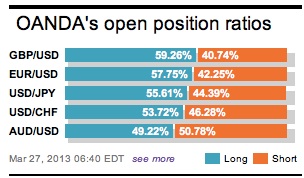Greek and periphery borrowing costs are attempting to creep higher as investor’s fear over Cyprus dominates a strong performance in the US. On the other hand, the US investor seems to be overlooking the Cypriot drama and focusing on domestic data in their attempt to push the S&P 500 to new heights. While all along, Cypriot officials work on capital controls to stem the flight of capital before reopening the islands commercial banks tomorrow. The bailout deal for the country and concerns about what implications could have for other Euro depositors in other member countries is weighing on the 17-member single currency this morning. Never too far away are the rating agencies – lurking in the background, preparing to clip the tiny island’s credit rating wings.

Safety should remain the dominant ‘flavor du jour’ whether its been promoted by Cyprus, Korea or the Euro-zone as a whole. The historical reserve currencies of choice – CHF and JPY – overall remain relatively bid, along with bonds, bunds and gilts as the markets head towards the Easter holiday long weekend. Month-end combined with Japanese fiscal year-end will persuade most investors to want to play it safe as liquidity becomes more of an issue in the next 24-hours.
The focus for Yen is the Bank of Japan’s upcoming policy meeting next week. The currency from the ‘rising sun’ remains subtly in demand despite the new BoJ governor Kuroda disclosing his policy plans for government-bond purchases and other easing measures. The new governor is to consider a number of alternative steps that will counter measures his predecessors. Policy makers will supposedly look at longer maturities and the amount of government bonds the central bank can buy. Abenomics has yet to significantly and consistently weaken the Yen. All along this market has been positioning itself for bold moves by the central bank. Next week we get to see if Japanese policy makers are again capable of disappointing current position holdings so soon.

The Cyprus crisis has opened up some precedents that will make investors more worried about how future Euro-zone crises will develop. If Euro policy makers shout it often enough they will convince themselves that its true – Cyprus is a “unique” case – but so was Greece and Ireland, Italy and Portugal and most likely soon to be Spain. The PIIGS and Cyprus are all unique according to most Euro-policy makers. The only thing that the EU has achieved with certainty this week with their “no new precedent” Cypriot situation is that bank creditors are no longer sacred in Europe, not even depositors.
The Cypriot position is changing the EU rule handbook and allowing ‘traditional’ capitalism to work. With the stronger north taxpayer hesitating at the cost of rescuing their cash-strapped southern neighbors, policy makers have succeeded in placing the order of who loses out in a rescue, assigning risk where it belongs – investors, bondholders and eventually even deposit holders. If that is insufficient from preventing systematic risk, then taxpayers will have to share a portion of the burden.
The obvious downside is that some of the weaker Euro members will now surely become exposed to potential depositor flight risk. By default, this will push the already weaker financial institutions under further stress. In turn, this will only make financial institutions even more cautious, the consumer more nervous and the bank depositors a little more suspicious. A reaction like this will simply end up affecting growth rates across Europe, making it even a little weaker than before.
If bank creditors are to lose money it is has to be through a “fair and transparent structure” – hence the “no template” Cypriot template approach. This is the shot across the investor bow – buyers beware. This new basic credit write-down structure formula is also aimed to avoid using any EU bailout fund, like the ESM, to recapitalize banks.
The Cyprus fallout and the way it has been handled is a root problem for the single currency. Due to cultural diversity, consensus is rather slow and has been proven chaotic as witnessed over the past two-weeks. Now, if we were to add some not yet named troubled banks, any depositors with flight risks potential and ad-hoc policy making one should be wondering when and where the next phase of the euro-crisis would be. In the end and for certain “a Euro in a bank in Cyprus is not the same thing as a Euro in a German bank.”

EUR option barriers are aplenty this morning. The single currency is been strangled by option plays every 50pts below while corporate EUR/JPY selling has managed to trigger the 1.2800 benchmark handle. More volatile price action can be expected as defense ahead of barriers is mounted below. Technically, downside EUR pressure should remain now that spot has broken below yesterday’s base low. Any intraday correction should be limited as more EUR offers dominate the topside. However, it’s a short trading week and market goes where there is liquidity.

Other Links:
Owning EURO’s Needs Convincing
This article is for general information purposes only. It is not investment advice or a solution to buy or sell securities. Opinions are the authors; not necessarily that of OANDA Corporation or any of its affiliates, subsidiaries, officers or directors. Leveraged trading is high risk and not suitable for all. You could lose all of your deposited funds.



